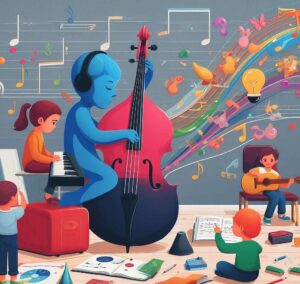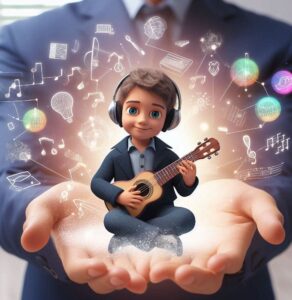Educating the youth is a task that has many facets, one of which, and perhaps even overlooked at times, is music education. Music education is a field within the education sector that focuses on teaching and learning different aspects of music. The value of understanding its effects on child development can offer profound insights into the holistic growth of a child.
Background and History of Music Education

Music education, intrinsically linked with cultural and societal norms, has had a significant role in human civilization. From the ancient Egyptians and Greeks to modern cultures worldwide, music has often sat at the center of education, instilling deeper cognitive abilities and emotional understanding in children.
The history of music education is rich, dating back to the days of ancient Egypt. Thousands of years ago, the Egyptians understood the profound impact music could have. They began setting up specialized schools to teach religious chant to boys destined to become choirmasters. It was not merely a form of art or entertainment but served a higher purpose of spiritual and societal bonding.
Moving forward in history, the Greeks, renowned for their philosophical ideologies and cultural richness, perceived music and arts as central to education. Influential philosophers like Plato and Aristotle stressed the importance of music education in the nurturing of the soul.
In the Middle Ages, the Church provided musical training. Only men were allowed to sing in church, leading to the establishment of choir schools to train boys in singing. During the Renaissance period, music education broadened and became more practical as music began to be written in a format that allowed individuals to interpret it independently.
Fast forward to the 21st century; music education continues to evolve, with modern schools incorporating it into their curricula and emphasizing its role in a well-rounded education. This evolution also embraces after-school programs that offer students various musical experiences, from playing in bands and orchestras to singing in choirs or composing their music.
In many educational systems around the globe, music education has made its way from being an extracurricular activity to a valued and established subject within the curriculum. However, the journey of music education across centuries is a testament that it is not just a transient trend but an integral part of human growth and societal development. This unique blend of culture and learning that music education offers is instrumental in bringing about a holistic educational experience for learners around the world.
Understanding Child Development
Child development is an intricate process involving various changes that take place from birth to adolescence. These transformations are not just physical but expand in their scope to impact a child’s cognitive, social, emotional, and psychological well-being. Understanding child development is crucial as it forms the bedrock of a child’s future health, happiness, growth, learning ability, and overall functioning in life.
Child development is characterized by the progression of a plethora of abilities and skills. Perhaps one of the most relatable aspects of this broad term is the physical development of children that includes the attainment of motor skills. From a mere reflexive response as newborns to the coordinated movements as toddlers, and eventually the complex actions performed by adolescents, physical growth symbolizes the apparent milestones of child development. They not only develop strength and motor coordination but also acquire the precision and agility necessary to perform day-to-day activities.
In addition to physical development, children experience a cognitive revolution throughout their growth period. Cognitive development pertains to the evolution of a child’s ability to think and understand. Exploring the surroundings, learning a language, formulating ideas, remembering facts, solving problems —all fall into the realm of cognitive development. The foundations of cognitive abilities lie in early childhood education that trains the young brain to examine, assimilate, and act upon the information it receives.
Language development, an important subset of cognitive development, is another crucial aspect of child development. As children grow, they learn to understand, use, and interconnect sounds, gestures, and symbols to express themselves and communicate with others. From babbling as infants to constructing complex sentences as adolescents, language development unlocks a world of interaction and understanding for children.
Child development also delves deep into the psychological realm involving emotional and social skill development. Children learn a spectrum of emotions and begin to understand how to handle their feelings of joy, anger, fear, or sadness. At the same time, social development transforms a self-focused toddler into an understanding and cooperative adolescent. Social skills include understanding the norms of society, respecting others, cooperating in groups, and managing relationships.
In the journey of child development, education stands as a pillar of support. It is the baton that directs and nurtures the capabilities of children, transforming them into skilled and empathetic individuals. Early education builds upon innate abilities and fuels curiosity to explore, learn, and grow. Besides imparting knowledge, education also instills moral values, fosters social skills, stimulates creativity, and cultivates a thirst for lifelong learning.
Child development is a multifaceted journey that not only concerns the biological growth of a child but is a comprehensive blend of cognitive, language, social, emotional, and physical development. A proper understanding of these aspects by parents and educators is paramount as it allows them to provide the necessary environment for children to explore their potential, tackle challenges, and develop resilience—setting the stage for a successful transition to adulthood.
Music Education and Cognitive Development
Music education is a powerful tool that greatly enhances cognitive development, with several key areas that extend and deepen our understanding of this relationship.
Music education stimulates language development by activating the same areas of the brain used for processing language. Engaging with music, whether through singing, playing an instrument, or listening, can refine auditory discrimination, allowing children to pick up on the subtle differences in sounds. This enhances their phonetic recognition pivotal for spoken language. Additionally, singing and rhythm exercises can amplify a child’s ability to articulate words and enrich their vocabulary, as music often introduces children to words and phrases they might not otherwise encounter.
Involvement in music-related activities contributes to improved memory and attention span. The act of learning to play an instrument or memorizing a song demands a high level of cognitive engagement and concentration. Children are required to remember chords, read music sheets, recognize note patterns, and maintain rhythm and pitch – all of which are exercises in mental sharpness and focus. This, in turn, could have a ripple effect, with improvements seen in areas of academic education that require memory retention and sustained attention.
Music education enhances children’s mathematical and problem-solving abilities. Music might not seem related to mathematics at first glance, but it inherently relies on patterns and structures, much like math. For instance, understanding musical notes and scores requires knowledge of ratios and fractions; composing and playing music demands comprehension of patterns and sequences. This strengthens numerical skills and fosters logic reasoning, both central to problem solving and mathematics.
The challenges faced when learning an instrument cultivates patience, perseverance, and resilience, vital attributes when tackling complex problems. An intricate piece of music demands step by step analysis, similar to solving a mathematical problem, thus nurturing a child’s ability to think critically and creatively.
Music Education and Social-Emotional Development

Music education holds a special place in enhancing social-emotional development in children. It opens doors to unique learning experiences that foster a sense of togetherness, confidence, and emotional understanding.
Performing in a group, for example in a choir or a band, gives children the chance to learn the importance of teamwork and collaboration. They come to understand that every player’s contribution is valuable to create a harmonious sound. Such experiences teach them the essence of mutual respect, patience, and cooperative learning. It also trains them in communication skills as they need to listen to others and express their own ideas to work together successfully. All these social skills learnt in their music classes can significantly impact their interactions and relationships outside of the classroom as well.
Music’s role in bolstering individual strengths cannot be overstated. Performing a solo piece in front of an audience is initially a daunting task for many young learners. However, with practice, they learn to overcome their fears, gaining a significant boost in self-esteem. Mastering an instrument or a difficult piece of music can also provide a keen sense of achievement, further enhancing self-confidence. It instills courage and a resilience, teaching students that they can conquer challenges with persistence and effort.
Music education offers an exquisite journey into a wide range of emotions, aiding in emotional development. Understanding the emotions conveyed in songs or instrumental pieces helps children explore their feelings. Lyrics often express an array of sentiments—from joy, love, and excitement to sorrow, loss, and disappointment—giving children a comfortable platform to discuss and understand these emotions. It promotes self-expression and assists children in dealing with their emotions in a healthy manner.
Music education can also foster the development of empathy. As students learn to interpret the emotions in a piece of music, they begin to understand and share the feelings of others. This experience helps to broaden their perspective, fostering tolerance and promoting emotional sensitivity towards others.
Music education provides an invaluable contribution to children’s social and emotional development. Beyond just the cognitive development, it enhances collaboration skills, instills confidence, aids in emotional understanding, and fosters empathy. The skills and values gained from music education significantly contribute to a child’s holistic development, preparing them for life beyond the academic sphere and helping them become sensitive, confident, and empathetic individuals.
Learning music is not just about brain-training; it also hones physical abilities. Manipulating a musical instrument requires controlled movements, helping develop fine motor skills. It improves hand-eye coordination as children must read musical notes while playing the instrument. In addition, musical theatre or dance aids in boosting physical agility and precision.

